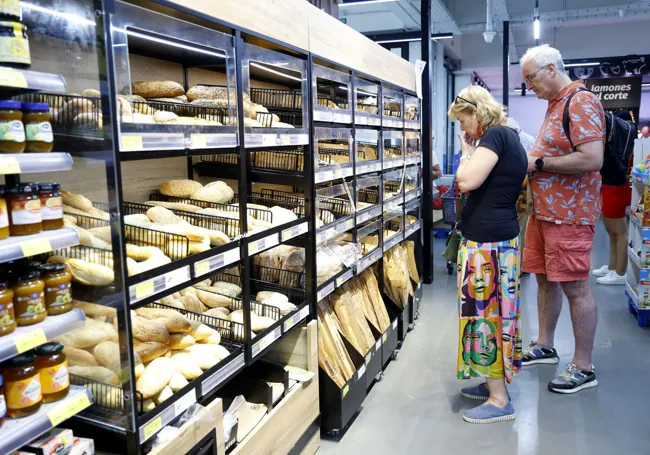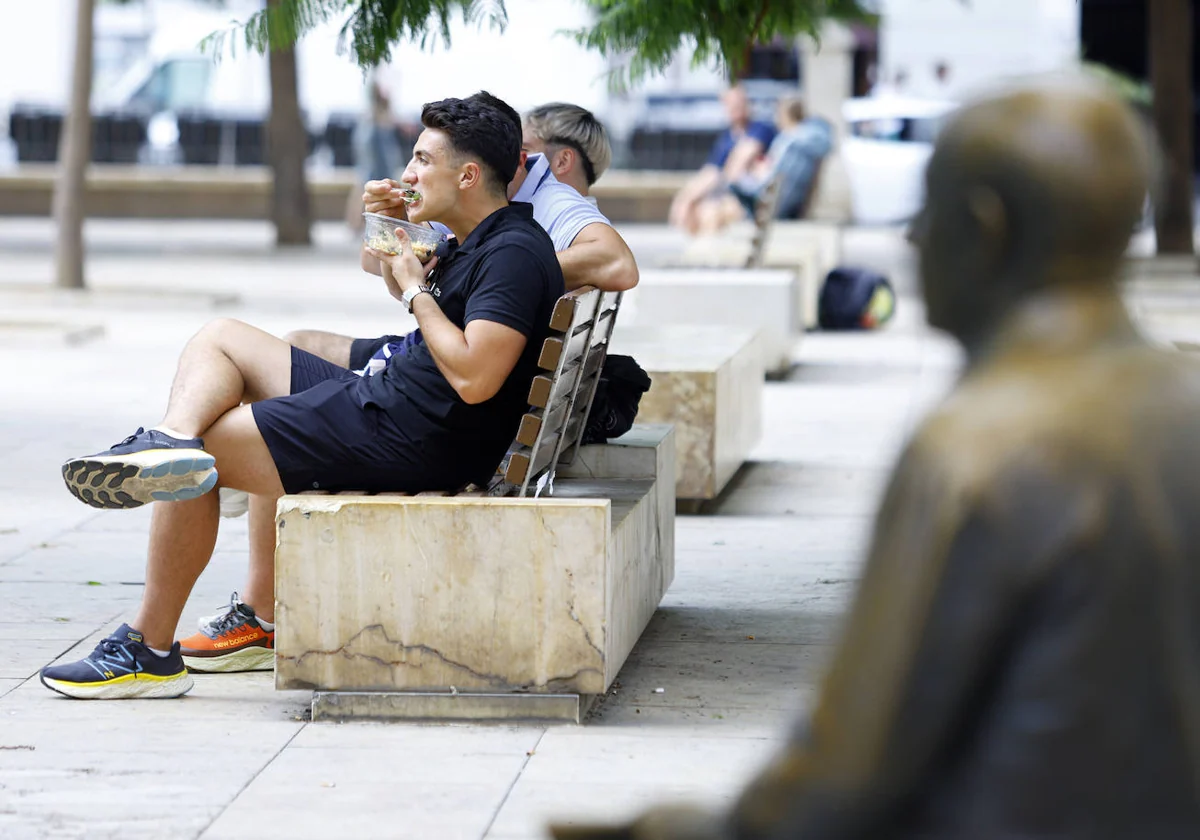Supermarkets make a killing from tourism on the Costa del Sol
The boom in non-hotel accommodation is helping to boost sales in stores across Malaga province, which are adapting to this new clientele
It's the Mercadona supermarket in Playamar (Torremolinos), and it's three o'clock in the afternoon on any Saturday or Sunday in August. Situated just a few metres from the promenade and next to the gigantic apartment towers that give the neighbourhood its name, the store is packed with customers; this is nothing new but the norm throughout the summer. What is striking is that there are tourists having lunch right here, in the 'office' area provided by the supermarket with a microwave, chairs and tables. They buy ready-made meals, heat them up and sit down to eat before returning to the beach.
Going on holiday to the other side of the country or to another continent to end up eating in a Mercadona store. Tourism today provides paradoxes like this. When budgets are tight and restaurant prices become unaffordable, supermarkets emerge as an economic alternative for holiday subsistence. This can also be seen in the centre of Malaga city: in the parks and squares it is not unusual to see visitors eating a packaged salad or a sandwich they have just bought in a supermarket.
The boom in residential tourism and non-hotel accommodation has clear beneficiaries in the supermarkets, which are making a killing by filling the fridges of tourist homes in a context, moreover, of rising prices in restaurants. In reality, this is nothing new on the Costa del Sol: along the entire stretch of coastline from Torremolinos to Estepona and also in the more touristy municipalities of the Axarquia region such as Nerja and Torrox, supermarkets and hypermarkets have always multiplied their turnover in summer with the arrival of second home owners and tenants of tourist rental flats.

Express supermarkets
Where it is a recent phenomenon is in Malaga city. The proliferation of tourist accommodation in recent years has generated a juicy business opportunity that retail chains have not hesitated to take advantage of. The city centre and its surroundings, where there used to be a shortage of food shops, are now dotted with urban supermarkets: a type of establishment that is characterised by its small size, its limited repertoire and, above all, the fact that it is usually open every day, including Sundays and public holidays. They are designed to facilitate small, last-minute purchases: perfect for buying bread and coffee for breakfast, a bottle of water or a pizza for dinner. Carrefour Express and Supermercados Mas are two of the brands that have opted for this format in Malaga. The former already has fifteen establishments in the capital, five of which are in the main city centre.
What are the retail chains saying, and is the increase in non-hotel tourism being reflected in supermarket sales? From the Andalusian confederation of food and perfumery businesses, its director general, Álvaro González Zafra, speaks of a "moderate growth in sales of between 2 and 3%" compared to last summer. "It has been a positive summer", he confirmed. Sergio Cuberos, owner of the Malaga chain Maskom Supermercados, reports the same figure. Neither of the two dare to directly relate this increase in sales to tourism, although they recognise that everything helps.
Cuberos explained that in the case of his chain, the establishments located in coastal towns, such as Torremolinos or Fuengirola, have always increased their turnover significantly in the summer months due to the tourist component. "This is nothing new," he said. He does recognise that the non-native customer has also become important for several of his supermarkets in the capital. "The one that receives the most tourists, without a doubt, is the one in the Merced market, but many also come to the one in Calle Duque de Rivas, in the Molinillo area", he affirmed.
What do tourists buy?
What and how do tourists buy? "Mostly things for breakfast: coffee, bread, milk, juices. Also a lot of ready-made meals: salads, omelettes, lots of snacks and appetisers, sandwiches to take to the beach, fruit... also personal hygiene items. Then it depends on the profile of the tourist: young people are usually more chaotic and improvise more: they come one day for one thing, another day for another... whatever comes up. Families make more organised purchases", explained the owner of Maskom.
Supermarkets adapt their offer to attract foreign customers. From putting up signage in English to finding staff with foreign language skills, to adapting the product range to the tastes and needs of these customers. It is not unusual to find baked beans or the most popular brands of tea in the UK, for example. But in this sense, Cuberos pointed out that consumption habits do not differ so much from those of the local population: the commitment to prepared dishes is common in more and more households, whether on holiday or not.
Consumers are returning to the physical shop to try to save money
A study by Asedas (Asociación Española de Distribuidores, Autoservicios y Supermercados) confirms that the shift of customers from the physical shop to the online store in Spain is reversing. The study links the return to the conventional shop as a way to control spending, but also as a consumer endorsement of the value of proximity. Within the three consumer groups analysed, offline shopping is up 5 percentage points (added to the 7 points it gained in 2023); mixed shopping - omnichannel - lost almost 5 points (compared to 6 points the previous year); and online-only shopping remains stable. With the effects of the pandemic - which gave a boost to the online channel - receding, consumers are returning to the physical channel for price, proximity (51% of respondents), assortment, quality and trust (30% of respondents); in fact, 21% of consumers who have tried the online channel say they have stopped or will stop very soon.

